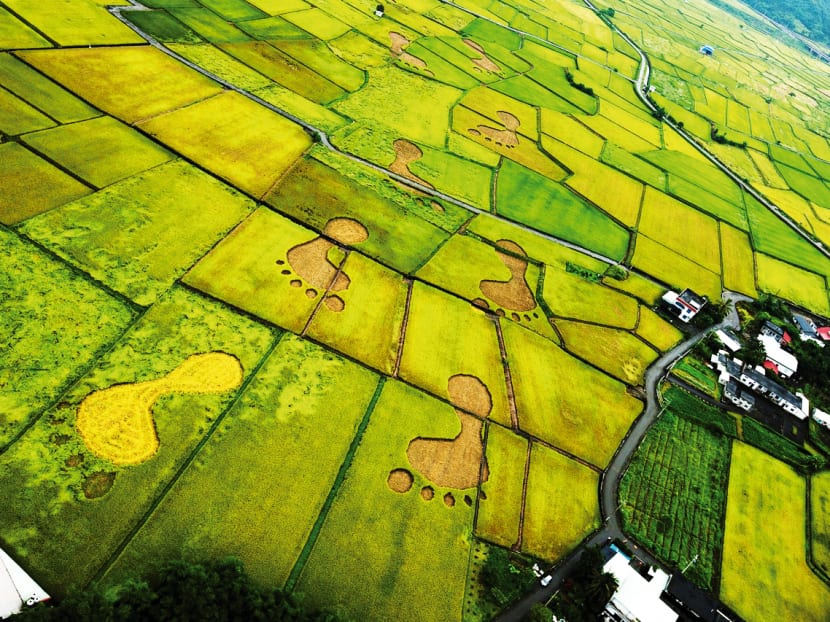Going above and beyond documentary film-making
SINGAPORE — They say a picture speaks a thousand words. In Chi Po-Lin’s case, it triggered an entire nation’s consciousness.

Aerial shots of
the famous
“big foot” wheat fields of Hualien county in Beyond Beauty: Taiwan From Above.
SINGAPORE — They say a picture speaks a thousand words. In Chi Po-Lin’s case, it triggered an entire nation’s consciousness.
The civil servant-turned-documentarian’s first feature-length documentary, Beyond Beauty: Taiwan From Above, is the Golden Horse-winning ecological cautionary tale that served as a wake-up call to Taiwan and its government to address the country’s environmental problems. Thanks to his 20-year experience as an aerial photographer, Chi used stunningly impactful aerial shots of Taiwan’s landscape, passionately procured over three years and hundreds of flight hours, to document, highlight and expose the current environmental plight.
“I feel that I have a mission, an obligation to document Taiwan in moving images,” Chi told TODAY. “I think now is the era of moving images, where people watch videos and films all the time via the Internet and their smartphones and mobile gadgets. Hence, I think it will be a good medium to tell stories regarding our land and environment through a documentary.”
Chi’s documentary seamlessly juxtaposes the beautiful against the devastating, the natural against the economic, and focuses its critical lens on much-neglected environmental issues, which brought critical and commercial success. Beyond Beauty became Taiwan’s highest-grossing domestic documentary, raking in more than NT$200 million (S$8.3 million). The film was made on a budget of NT$90 million.
“I really appreciate the audience for their strong support by buying the movie tickets,” he shared. “By accepting this movie, I realise that Taiwanese people actually do have a very strong capacity for self-reflection and (creating) change.”
Q: Why did you want to make Beyond Beauty: Taiwan From Above?
A: I am naturally proud of the beautiful landscapes that Taiwan has to offer, but at the same time, due to economic development and growth in population, I see a conflict between progress and the harm that it is doing to our natural environment. Many people in Taiwan do not see these issues. I hope that through my observation and my documentation, the people of Taiwan can really see and get to know the land that they live in.
Q: Can you take us through the making of Beyond Beauty?
A: The process of documentary film-making, in terms of time and budget, is much more challenging than photography. Even though I am already quite a well-known aerial photographer, I still face a lot of rejection from many corporations and entrepreneurs. In order to raise the budget required, I had to mortgage my property to get the initial sum needed to purchase the aerial Cineflex camera to start shooting. It was only after I had the early footage that I was able to convince new partners and sponsors to come on board. Director Hou Hsiao-Hsien agreed to support me only after seeing some of the work that I did. But having his name attached to the project helped with the fund raising as well. Even when production was already ongoing, I was constantly racing against time, weather conditions and lack of funding to try and capture as much footage of Taiwan as possible.
Q: What were the more difficult challenges you faced making the documentary?
A: The challenges were mainly budgetary — and the weather. Such as when shooting the shots of the big foot wheat field at Hualien County, we couldn’t take off for six days due to heavy rain. I was about to give up, as we were spending money each day with the helicopter and crew rental, and I even slipped and fell onto the muddy field on the sixth day. Eventually, the skies did clear up for two to three hours, allowing me and my crew to capture the images.
Q: What prompted you to quit your government job four years ago to pursue the documentary project full-time?
A: As a civil servant, for example, you won’t be able to solicit for sponsorship and funding to make a film. There are also other limitations, such as the fact that you won’t be able to take such a long annual leave in order to shoot your film. Therefore, when I decided to make the film, I had to consider whether I ought to wait until I retired or quit. It took me a while. But if I were to wait till I retire, it might have been too late, as my physical fitness and willpower would not have been as strong. Hence, I decided to give up my retirement pension and leave my job to make the film.
Q: Your documentary spurred one of fastest government crackdowns on environmental offenses. How do you feel about that?
A: I never thought about how the government or the people would react to my film. My only thought was that I ought to do my part, capturing Taiwan (on film) and leaving behind a visual documentation of the island and its environment. I like to capture and document the things I see at this point of time, quite similar to music artistes and writers doing what they do with words and music, except that I do it with film. I knew that this film would attract the attention of some people, but the eventual response to the film was way beyond what I had expected. Our government has adopted a very positive and open-minded reaction. They did not reject me, despite the fact that my work exposed some of the uglier and negative aspects of Taiwan and its environment. Instead, it gave them strength and the people’s support to do the right thing by taking prompt action. So overall, I think I have done good by effecting real change in the government ... for the better.
Q: Do you think the film will have an impact beyond Taiwan?
A: My initial purpose and expectation were only for Taiwanese people ... to gain a better understanding of Taiwan and to love our land and environment. But after the overwhelming response to the film in Taiwan, I started to receive many invitations from film festivals around the world. In the past six months, after bringing this film to be showcased in many countries, we started to learn that the film actually allowed people to “see themselves”, no matter which territory they are from, be it Hong Kong, Singapore, Australia or Japan — the environmental issues raised in the film are happening in many places around the world, and people are able to reflect on the environmental issues they are facing in their own countries. I do hope that the film can be used in schools all over the world to help educate and advocate the importance of global environmentalism and remind people of the many issues that we continue to face.
Q: What do you think is the most important thing artistes and film-makers can do to address the problem?
A: I think celebrities and public figures can lead by example. When the film was playing in Taiwan cinemas, (rock band) Mayday, Lin Chi-ling and many other popular artistes came out to lend their support (of their own accord) by sharing on their own social media channels and platforms. Actually this is a positive thing as celebrities have a huge influence, and I do hope that celebrities and well-known public figures in Singapore would watch the film in cinemas and help encourage people to go watch the film to raise awareness of environmental protection.
Q: What are your thoughts on what is “truth” in documentary film-making, and finding that truth?
A: I feel that the most unique thing about aerial photography is that you do not require a lot of language and narrative to communicate something. The images speak for themselves. I think it is easier in that sense to remain neutral, rather than say a documentary about human characters or events, where the director is likely to hold a point of view.
Beyond Beauty: Taiwan From Above is in cinemas now.







